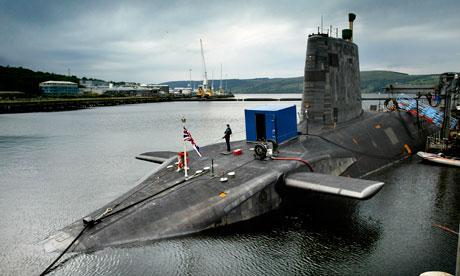Blog Archives
Simon Jenkins: “the absurdity of Britain’s nuclear deterrent”
Posted by admin
Today Donald sent round this valuable link to yet another gem of incisive thought and devastating mockery by national treasure, Simon Jenkins
Political Concern summarises points he made for reluctant or busy readers:
Jenkins “just cannot get enough of the Scottish referendum debate. On every side the unthinkable is thought, the unsayable said . . . revealing swamps of intellectual confusion our rulers would rather keep hidden . . . The murky covers are removed from:
- North Sea oil,
- the single currency,
- the Barnett formula,
- welfare dependency,
- the West Lothian question
- and the fate of Faslane and its Trident submarine base”.
Finance-driven:
No sensible defence expert Jenkins has ever encountered has any time for Trident. Its sole supporters are those with money in the project and lobbyists employed by them: “The world in which these people move is not one of soldiers, guns and bombs but of thinktanks, travel grants and seminars”.
Faslane and its missiles will cost British taxpayers £100bn over the next 25 years, but Britain could invade a dozen countries and seize their terrorists for less.
The language is that of faded imperialists . . .
A BBC programme on the topic by Andrew Neil on Tuesday revealed a cast of gloom-laden defence pundits bewailing Britain’s “loss of influence” if Scotland were “lost” and Faslane closed. Our seat at the top table would be removed. Hardly anyone mentioned defence, just prestige . . . out of their time. The only power they know is PowerPoint.
Relocate to Devon or the United States?
 An intriguing insight into the politics of nuclear weapons is Rusi’s tangential dismissal of concerns over an “accidental ignition of one or all of a submarine’s Trident D5 missiles” and the resulting contamination of 260,000 Devonians. The ignition of the warheads would also make a dreadful mess of Truro . . . but the defence ministry has the right to “waive safety requirements” where it is “in the interests of urgent national security”. The Rusi report discusses basing Britain’s deterrent where it surely belongs, in the US (birthplace of its missiles), particularly as we are told that the Americans retain the secret warhead codes specifically to forestall independent British use.
An intriguing insight into the politics of nuclear weapons is Rusi’s tangential dismissal of concerns over an “accidental ignition of one or all of a submarine’s Trident D5 missiles” and the resulting contamination of 260,000 Devonians. The ignition of the warheads would also make a dreadful mess of Truro . . . but the defence ministry has the right to “waive safety requirements” where it is “in the interests of urgent national security”. The Rusi report discusses basing Britain’s deterrent where it surely belongs, in the US (birthplace of its missiles), particularly as we are told that the Americans retain the secret warhead codes specifically to forestall independent British use.
The sight of a truly daft megaproject has Chancellor Osborne rolling on his back with his feet in the air, cash oozing from every pore
Osborne may be ruthless towards current government spending – he can guard a candle-end – but as soon as each multibillion-pound project – HS2, nuclear power stations, Heathrow runways, aircraft carriers – is announced in Whitehall, Jenkins watches the chancellor and a “rabble of salivating bankers and lobbyists (many of them paid parliamentarians) form a chorus to shout down any sceptic as variously killjoy or unpatriotic. The real victim is always the taxpayer”.
Was the Treasury once so effective?
Jenkins continues: “Not long ago, the Treasury was the one government institution prepared to call the bluff of such megaprojects and hold them to account. It showed lobbyists the door. It was the intellectual powerhouse of the public sector”.
Conclusion: “If the Scottish referendum does indeed force the absurdity of Britain’s nuclear deterrent out into the light of day, it is worth it for that alone. If it were to go further and kill Trident stone dead, it would be thank you, Salmond, thank you, Scotland”.
–


